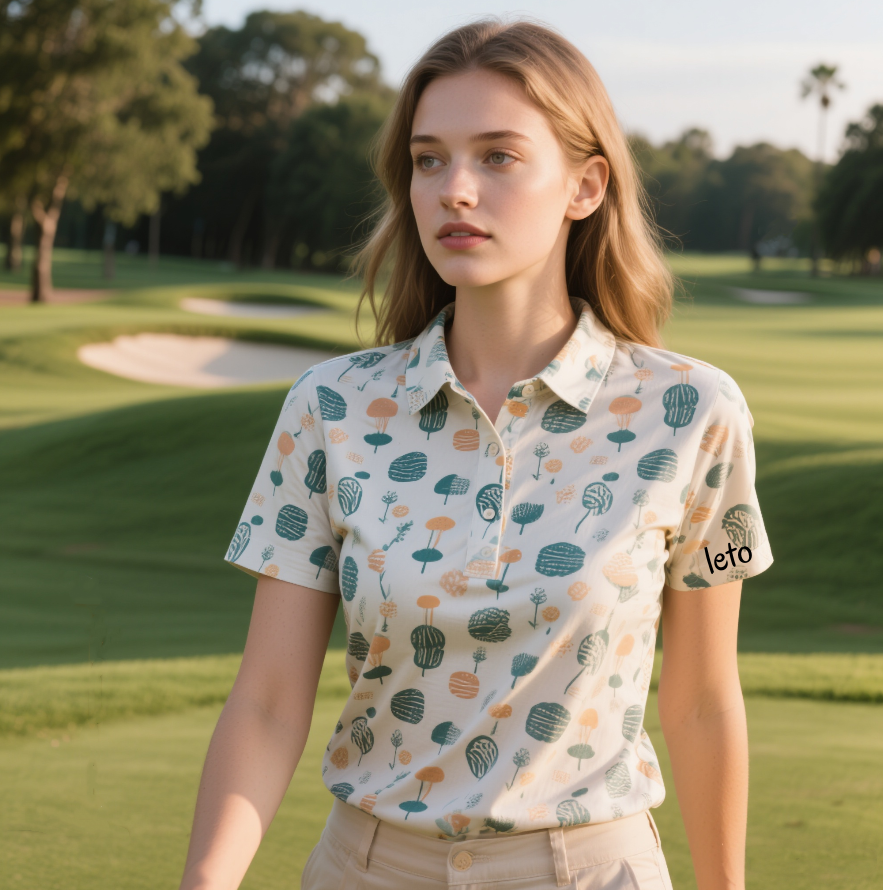Why Low MOQ Golf Clothing Suppliers Are Game-Changers for Small Brands
The golf apparel industry has experienced a remarkable transformation in recent years. The pandemic happened. And everyone started playing golf again. Now, four years into the Golfaissance, there are a lot of great brands in the space. This resurgence has created unprecedented opportunities for golf apparel startups and small brands to enter the market with innovative products and fresh perspectives.
Understanding the Modern Golf Apparel Landscape

Sustainability in golf apparel will become a dominant trend in 2025. With increasing consumer awareness about climate change and environmental impact, golf apparel brands will adopt eco-friendly materials, such as recycled polyester and biodegradable fabrics. This shift toward sustainability has leveled the playing field, allowing smaller brands to compete effectively with established manufacturers by offering eco-conscious alternatives.
The traditional golf apparel market has historically favored large-scale production with high MOQs, often requiring orders of 500-1,000 pieces or more. This presented significant barriers for emerging brands with limited capital and uncertain market demand. However, the rise of specialized low MOQ golf clothing suppliers has revolutionized the industry, making it possible for startups to launch with orders as small as 50 pieces while maintaining quality and profitability.
The Strategic Advantage of Low MOQ Manufacturing

Low MOQ golf apparel suppliers offer numerous advantages that extend far beyond reduced initial investment requirements. These partnerships enable brands to test market demand, iterate on designs quickly, and respond to consumer preferences without the financial burden of large inventory commitments.
For golf apparel startups, this approach allows for strategic market entry. Rather than investing heavily in a single product line, brands can diversify their offerings across multiple styles, colors, and performance features. This diversification strategy is particularly valuable in the golf market, where consumer preferences can vary significantly based on playing style, climate, and personal aesthetic preferences.
Sustainable Golf Apparel Manufacturing: Meeting Environmental Demands
The golf industry's environmental consciousness has reached a tipping point. Golf is evolving, and sustainability is finally getting the attention it deserves. More brands are stepping up, proving that you can play great golf and take care of the planet at the same time. This shift has created substantial opportunities for brands that prioritize sustainable manufacturing practices.

Eco-Friendly Materials and Production Processes
Modern recycled golf apparel suppliers are leading the charge in sustainable manufacturing. These suppliers utilize innovative materials, including recycled polyester derived from plastic bottles, organic cotton, and advanced synthetic fibers that offer superior performance while minimizing environmental impact. Each Nike Dri-fit Victory golf shirt ($55) is made with 100-percent recycled polyester fabric that is made from plastic bottles that the company diverted from landfills.
For emerging brands, partnering with a recycled golf apparel supplier offers dual benefits: meeting consumer demand for sustainable products while differentiating from competitors who may not prioritize environmental responsibility. This positioning is particularly valuable for brands targeting environmentally conscious consumers who are willing to pay premium prices for sustainable products.
Graphene Technology and Advanced Performance Features
The integration of graphene-infused golf wear temperature control represents a significant advancement in golf apparel technology. This innovative material provides superior thermal regulation, moisture management, and antimicrobial properties while maintaining the lightweight, breathable characteristics essential for golf performance. Low MOQ suppliers who offer access to these advanced materials enable small brands to compete with established manufacturers in terms of technical innovation.
Technical Specifications and Quality Standards

Quality standards in golf apparel manufacturing have become increasingly sophisticated, with specific requirements for performance, durability, and regulatory compliance. Understanding these standards is crucial for brands seeking to establish credibility in the competitive golf market.
Fabric Performance Standards
The implementation of 4-way stretch golf pants ISO 13934 testing ensures that golf apparel meets stringent performance requirements for flexibility, durability, and comfort. This standard evaluates fabric behavior under various stress conditions, ensuring that garments maintain their shape and performance characteristics throughout extended use.
Premium golf fabrics utilized by leading manufacturers incorporate advanced fiber technologies that provide UV protection, moisture-wicking capabilities, and temperature regulation. These technical specifications are particularly important for golf apparel, where players spend extended periods in direct sunlight and varying weather conditions.
Manufacturing Compliance and Certifications

Working with a BSCI audited golf wear factory ensures that manufacturing processes meet international standards for social responsibility, worker safety, and environmental compliance. BSCI certification encompasses a set of stringent standards and criteria. These include adherence to international labor standards, worker protection, and safe working environments. This certification is increasingly important for brands targeting international markets and socially conscious consumers.
AATCC 183 UV test methodology provides a standardized evaluation of UV protection properties in golf apparel. This testing ensures that garments provide adequate protection against harmful UV radiation, a critical consideration for golf apparel worn during extended outdoor activities.
Customization and Design Flexibility

Low MOQ golf clothing suppliers excel in providing customization options that enable brands to differentiate their products in the competitive golf market. This flexibility extends across multiple dimensions of product development, from aesthetic design to functional features.
Embroidery and Logo Application

The availability of embroidery golf hat minimum quantity options as low as 50 pieces enables brands to create cohesive product lines without substantial initial investment. Professional embroidery services can incorporate complex logos, brand elements, and decorative features that enhance product appeal and brand recognition.
Custom logo sport golf shirt production requires sophisticated equipment and skilled craftsmanship to ensure consistent quality across production runs. Low MOQ suppliers typically maintain advanced embroidery and printing capabilities that rival those of large-scale manufacturers, ensuring that small brands can achieve professional-quality results.
Personalized Design Solutions

Personalized golf wear represents a growing market segment, with consumers increasingly seeking products that reflect their individual style and preferences. Low MOQ suppliers can accommodate various personalization options, including custom color schemes, unique fabric combinations, and individualized sizing.
Custom golf wear solutions extend beyond basic personalization to include functional modifications such as additional pockets, specialized fits, and performance enhancements. This level of customization enables brands to target specific market niches and develop products that address unique consumer needs.
Market Opportunities for Golf Apparel Startups

The golf apparel market presents substantial opportunities for startups willing to innovate and differentiate their offerings. Understanding these opportunities and how to leverage low MOQ manufacturing partnerships is essential for success.
Targeting Underserved Market Segments
Ladies' golf apparel represents a particularly promising market segment, with growing participation rates among female golfers and increasing demand for fashionable, functional golf wear. Unique ladies golf apparel that combines performance features with contemporary styling can command premium pricing and build strong brand loyalty.
The development of cute golf outfits for ladies requires careful attention to both functional requirements and aesthetic appeal. Low MOQ suppliers can facilitate rapid iteration on designs, enabling brands to respond quickly to changing fashion trends and consumer preferences.
Specialized Product Categories
Lightweight golf vest tournament legal design represents a specialized category that requires specific knowledge of tournament regulations and player needs. These products must balance performance requirements with strict regulatory compliance, making them ideal for brands seeking to establish expertise in competitive golf markets.
Windproof golf jacket for coastal tournaments addresses specific environmental challenges faced by golfers in coastal regions. Products designed for these specialized applications can command premium pricing and establish strong brand positioning within niche markets.
Climate-Specific Solutions

Sweat-resistant golf wear for tropical climates addresses the unique challenges faced by golfers in hot, humid environments. These products require advanced moisture management technologies and specialized fabric treatments that provide comfort and performance in challenging conditions.
Non-restrictive golf polo full swing mobility represents another specialized category that requires sophisticated pattern design and fabric selection. These products appeal to serious golfers who prioritize performance over traditional styling conventions.
Manufacturing Excellence and Quality Control

Skilled craftsmanship remains fundamental to producing high-quality golf apparel that meets the demanding requirements of serious golfers. Low MOQ suppliers must maintain the same quality standards as large-scale manufacturers while providing the flexibility and responsiveness that small brands require.
Production Capabilities and Equipment
Modern golf clothing manufacturers maintain comprehensive production capabilities that include advanced cutting systems, precision sewing equipment, and sophisticated quality control processes. These capabilities ensure consistent product quality across production runs, regardless of order size.
The integration of digital printing and embroidery technologies enables efficient production of custom designs and small batch orders. These technologies reduce setup costs and production time while maintaining high-quality standards.
Quality Assurance Processes
Comprehensive quality control systems ensure that products meet specifications for fit, finish, and performance. These processes include incoming material inspection, in-process monitoring, and final product testing to identify and correct any quality issues before shipment.
Efficient manufacturing processes optimize production flow and minimize waste while maintaining flexibility to accommodate design changes and customization requests. This efficiency is particularly important for small brands that require quick turnaround times and responsive service.
Sustainable Practices and Environmental Responsibility

Environmental responsibility has become a defining characteristic of successful golf apparel brands. Low MOQ suppliers who prioritize sustainability can help brands meet consumer expectations while building competitive advantages.
Eco-Friendly Materials and Processes
Eco-friendly golf apparel for environmentally conscious brands incorporates recycled materials, organic fibers, and low-impact manufacturing processes. These materials provide comparable performance to conventional options while significantly reducing environmental impact.
Organic cotton golf wear supplier for eco-conscious retailers offers alternatives to conventional cotton that eliminate pesticide use and reduce water consumption. These materials appeal to environmentally conscious consumers while providing the natural fiber properties that many golfers prefer.
Waste Reduction and Circular Economy
Sustainable manufacturing practices include waste reduction strategies that minimize material waste and energy consumption. These practices not only reduce environmental impact but also improve production efficiency and cost-effectiveness.
The development of circular economy approaches in golf apparel manufacturing includes programs for garment recycling, material recovery, and product lifecycle extension. These initiatives align with consumer expectations for environmental responsibility while creating opportunities for brand differentiation.
Case Studies and Success Stories

Examining successful implementations of low MOQ golf apparel manufacturing provides valuable insights for brands considering this approach.
Country Club Uniform Redesign Case Study
A recent country club uniform redesign case study demonstrates the effectiveness of low MOQ manufacturing in addressing specific client requirements. The project involved developing custom uniforms for country club staff that balanced professional appearance with comfort and functionality.
The project began with an initial order of 75 pieces across multiple styles and sizes, allowing the country club to evaluate fit, comfort, and durability before committing to larger quantities. This approach enabled refinements to sizing, fabric selection, and design details that improved the final product.
The success of this project led to additional orders and expansion to other country clubs, demonstrating how low MOQ manufacturing can facilitate market entry and growth for specialized applications.
Luxury Golf Apparel Development
Luxury golf apparel brands' ladies market represents a high-value segment that requires exceptional quality and attention to detail. Low MOQ suppliers with appropriate capabilities can support brands entering this market by providing access to premium materials and sophisticated manufacturing processes.
A successful luxury brand launch utilized low MOQ manufacturing to develop a collection of premium golf apparel that combined traditional craftsmanship with contemporary design. The approach enabled the brand to establish market presence and build a customer base before scaling production.
Innovation and Technology Integration

The integration of innovative technologies in golf apparel manufacturing enables brands to offer products with enhanced performance characteristics and unique value propositions.
Smart Fabric Technologies
The integration of wearable technology into golf apparel will become more prevalent in 2025. Smart fabrics embedded with sensors could track performance data, such as swing speed, heart rate, and body posture. These technologies represent opportunities for brands to differentiate their products through functional innovation.
Advanced fabric treatments provide enhanced performance characteristics such as antimicrobial properties, UV protection, and temperature regulation. These treatments can be applied to various base materials, enabling brands to offer enhanced functionality across their product lines.
Innovative Design Approaches
Innovative golf fashion combines traditional golf apparel aesthetics with contemporary design elements and performance features. This approach appeals to younger golfers who seek products that reflect their personal style while providing necessary functionality.
Trendy golf apparel that incorporates fashion-forward design elements can appeal to broader consumer segments beyond traditional golf enthusiasts. This approach enables brands to expand their market reach while maintaining golf-specific performance requirements.
Building Brand Identity and Market Position

Successful golf apparel brands develop strong identities that resonate with their target audiences and differentiate them from competitors. Low MOQ manufacturing partnerships can support brand development by providing flexibility and responsiveness.
Brand Differentiation Strategies
Developing unique brand positioning requires understanding the target customer's needs and preferences. Low MOQ suppliers can facilitate rapid prototyping and testing of new concepts, enabling brands to refine their positioning based on market feedback.
The ability to offer customized products and personalized service creates opportunities for brands to build strong customer relationships and loyalty. These relationships become particularly valuable in the golf market, where word-of-mouth recommendations and personal relationships significantly influence purchasing decisions.
Market Entry and Expansion
Low MOQ manufacturing enables brands to enter new markets with minimal risk and investment. This approach allows for testing market demand and refining product offerings before committing to larger production runs.
International market expansion becomes more feasible with low MOQ partnerships, as brands can test products in new geographic markets without substantial inventory commitments. This approach enables gradual expansion and market learning that reduces risk and improves success rates.
Supply Chain Management and Logistics

Effective supply chain management is crucial for golf apparel brands, particularly those working with low MOQ suppliers. Understanding logistics requirements and building efficient supply chain relationships support business growth and customer satisfaction.
Supplier Relationship Management
Building strong relationships with low MOQ suppliers requires clear communication, mutual understanding of expectations, and collaborative problem-solving approaches. These relationships become particularly valuable during peak seasons and when addressing quality or delivery challenges.
Regular supplier evaluation and performance monitoring ensure that partnerships continue to meet brand requirements and quality standards. This ongoing assessment enables proactive identification and resolution of potential issues before they impact customer satisfaction.
Inventory Management and Forecasting
Low MOQ manufacturing enables more sophisticated inventory management approaches that reduce carrying costs and minimize obsolescence risk. Brands can maintain smaller safety stocks while ensuring product availability through responsive supplier relationships.
Demand forecasting becomes more accurate with low MOQ manufacturing, as brands can test market demand with smaller quantities before committing to larger production runs. This approach improves inventory turnover and reduces the risk of overstock situations.
Financial Considerations and Investment Strategy

The financial implications of partnering with low MOQ golf clothing suppliers extend beyond initial order costs to include considerations of working capital, cash flow, and long-term profitability.
Cost-Benefit Analysis
While per-unit costs may be higher for low MOQ orders compared to large-scale production, the total investment requirement is significantly lower. This enables brands to launch with limited capital while maintaining cash flow flexibility for marketing and business development activities.
The ability to diversify product offerings across multiple styles and categories reduces risk and enables brands to identify successful products before investing in larger quantities. This approach improves overall return on investment and reduces the risk of significant losses.
Scaling Considerations
Successful brands must plan for growth and understand how their manufacturing partnerships will support scaling. Low MOQ suppliers with capabilities for larger production runs can provide continuity as brands grow, while maintaining the flexibility and responsiveness that enabled initial success.
The transition from low MOQ to larger production runs requires careful planning and coordination to maintain quality standards and delivery performance. Brands should establish clear milestones and growth trajectories with their manufacturing partners to ensure smooth scaling.
Future Trends and Market Evolution

The golf apparel market continues to evolve, with new trends and technologies creating opportunities for innovative brands and manufacturing partnerships.
Emerging Technologies
Athleisure will continue to play a major role in golf fashion. The integration of golf apparel with lifestyle and casual wear creates opportunities for brands to expand their market reach and appeal to broader consumer segments.
Advanced manufacturing technologies, including 3D printing, automated cutting systems, and digital pattern-making, enable more efficient production of customized products. These technologies particularly benefit low MOQ manufacturing by reducing setup costs and production time.
Consumer Behavior Evolution
Changing consumer preferences toward sustainable, customizable, and performance-oriented products create opportunities for brands that can effectively leverage low MOQ manufacturing partnerships. These preferences align well with the capabilities and advantages offered by specialized low MOQ suppliers.
The increasing importance of brand authenticity and social responsibility in consumer purchasing decisions favors brands that can demonstrate a genuine commitment to these values through their manufacturing partnerships and business practices.
Conclusion: Partnering with Leto for Golf Apparel Success

The advantages of partnering with a low MOQ golf clothing supplier extend far beyond reduced initial investment requirements. These partnerships enable brands to enter markets with minimal risk, test and refine products based on consumer feedback, and build sustainable businesses that can adapt to changing market conditions.
Leto Golf Manufacturing represents the ideal partner for golf apparel startups and established brands seeking to leverage low MOQ manufacturing advantages. With comprehensive capabilities including custom embroidered golf apparel, sustainable golf apparel production, and skilled craftsmanship across all product categories, Leto provides the flexibility, quality, and responsiveness that modern golf brands require.
The combination of advanced manufacturing capabilities, sustainable practices, and commitment to customer success makes Leto the preferred choice for brands seeking to establish themselves in the competitive golf apparel market. By partnering with Leto, brands gain access to the expertise, resources, and support necessary to build successful, sustainable businesses that can thrive in the evolving golf apparel market.
Whether developing unique ladies' golf apparel, creating custom embroidered golf polo shirts, or launching innovative golf fashion collections, Leto's low MOQ capabilities and comprehensive services provide the foundation for success in the dynamic golf apparel industry.
Post time: 25-07-17








